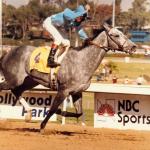
Top Win Contenders in Competitive 2026 Lecomte Stakes

After months of searching, you’ve found the perfect horse. There’s only one problem … people are telling you not to buy him because he’s a “war horse.”
Perhaps one of the biggest debates when it comes to buying off-track Thoroughbreds is if buying a war horse (those with 50 starts or more) leaves you a horse with soundness issues. Not surprisingly, buyers are leery about taking that risk but New Vocations Racehorse Adoption Program’s Anna Ford says the opposite is true about soundness issues.
“The majority of the time we have found war horses to be some of the sounder horses,” she said. “If they can run 50-plus races they should be pretty sound. Of course, they do tend to have some wear and tear, but most are very manageable with some maintenance.”
While war horses have obviously spent a longer period being a racehorse, ReRun Thoroughbred Adoption’s Lisa Molloy says their longevity on the track can play to a rider’s advantage. That time on the track exposes a horse to all kinds of different things your average horse would never encounter.

“There is very little that they have not seen,” Molloy said. “They have been exposed to so many things, have shipped all over multiple times, and with claimers they have had to adjust and continue to succeed while undergoing a change of trainers and stabling. They have a depth of experience and knowledge that makes them ideal if capitalized upon correctly to transition into another career. I also feel that if they have stood up to the rigors of training over a period of several years, for the typical pleasure rider the horse will have no trouble being sound and purposeful for a second career.”
However, that extended racing career can make a few things challenging and Ford points out that there needs to be a little more understanding when transitioning them to their second career. For many war horses, they’ve raced for at least five years so a routine away from the track is a culture shock to them.
“Most have been at the track for years and can really benefit from some down time,” Ford explained. “However, since they are used to being stalled 23 hours a day, you never want to just kick them out in the field. Rather slowly transition them to turn out and get them a buddy to teach them to relax. Once they are happy being turned out for part of the day and seem happy both physically and mentally then putting them back to some light work is great. They are used to having a job so doing something daily can be good, but I would start by hacking out and not focusing on real work till they are fully relaxed just riding out and about. They are coming from a high intense workload so short fun rides are best to help them just relax.”
Working with many war horses in her career, Molloy says that war horses are different than lighter raced horses but that isn’t a bad thing. In fact, it can work to their new rider’s advantage, but they also deserve something in return.
“I find them a lot better to work around, much easier to read both on the ground and under tack and they come with a fully developed sense of self and personality. They are hardy, tougher mentally and they know the gig – they can read people a mile away,” she explained. “These horses have paid their dues, know the deal and they deserve understanding and a certain degree of reverence for what they accomplished on the track. In many cases if you are prepared to listen, they can definitely teach us as riders and trainers a thing or two.”
In all, if you find a warhorse who sounds perfect in every way except his race record, don’t automatically discount him. Like any other horse, a good vet check is a smart idea and helps you know if the horse is right for you.
This is the first piece in a series of blogs featuring war horses who have gone on to long careers after their time on the track. Over the coming months, we will introduce you to war horses who have spent their second careers doing everything from hunting with hounds to barrel racing.